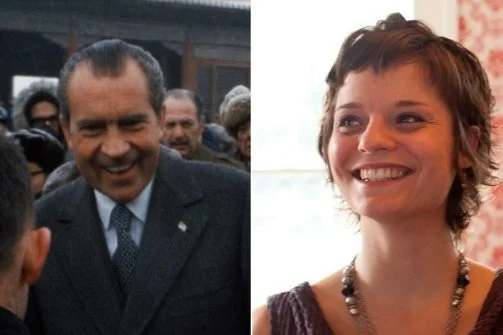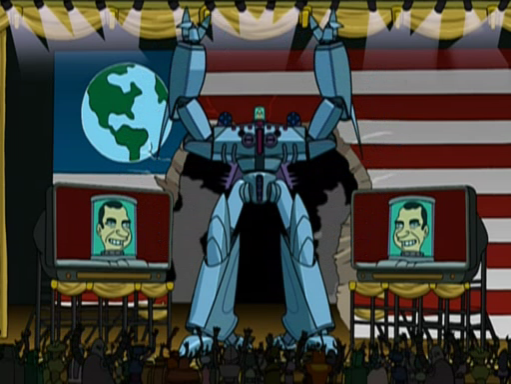ATLFF Alum OUR NIXON Takes On Nixon Speechwriter Ben Stein
Ben Stein, former Nixon speechwriter and actor--best known for his role in Ferris Beuller's Day Off--has seen Our Nixon and wasn't pleased. He penned a piece for The Daily Beast in which he praises the film for "start[ing] out as history," but then derides what he sees as an "extremely unbalanced negative portrait of a man who did the ultimate that any human can do—make peace among men." In Stein's estimation, "the film deteriorated into the usual propaganda of the Nixon haters."
Our Nixon co-producers Penny Lane and Brian Frye have followed up with a point by point rebuttal.
We directed and produced Our Nixon, and we are grateful for the opportunity to respond to Stein’s statements. We would also like to correct some misstatements of fact in Stein’s op-ed.
Stein states: “On Thursday August 1, 2013, CNN will air in primetime a film it helped to produce about Richard Nixon’s presidency.”
In fact, CNN did not help to produce Our Nixon. We produced the film independently and licensed it to CNN.
Stein states: “The novelty of the film Our Nixon was that it was supposedly made from several hundred hours of Super 8mm home movies by three Richard Nixon aides: Dwight Chapin, appointments secretary; H.R. ‘Bob’ Haldeman, chief of staff; and John Ehrlichman, head of the domestic council.” And he states: “The movie is only in small part made from the Super 8 films taken by these three men (the latter two long deceased). Most of it is from newsreels, TV news tapes and from Nixon’s own Oval Office recording system.”
In fact, Our Nixon was made from about 26 hours of Super 8 home movies filmed by Haldeman, Ehrlichman, and Chapin, or about 450 individual rolls of film. While it is a collage of home movies, news broadcasts, interviews, and other materials, about 60 percent of the images in the film come from the Super 8 home movies.
You can read the entire response on The Daily Beast.
Robo-Nixon on Futurama.
As a programmer, I'll say I'm sensitive to Stein's concerns. Nixon is easily in the top 5 of historical figures that have never left the public consciousness and that the public fervently believes they know well. As a result, comedy writers have been milking Nixon for every joke they can for decades--when's the last time you heard someone drop an Eisenhower joke. When American citizens like Eric Snowden are in the news for leaking information about NSA spying, its natural and easy for the critiques of the Obama administration to evoke Nixon's name. Without having to reacquaint readers with a history lesson, it's not as easy to use John Adams and the Alien and Sedition Acts as comparisons.
Stein was right to view Our Nixon with a jaundiced eye. No documentary should be viewed without some level of healthy skepticism.
Prior to seeing the film, I'd be lying if I didn't say I was worried that Our Nixon was going to tread the well worn ground of hyper-focusing on Watergate and Vietnam. That concern doesn't flow from my personal politics as much as it flows from my desire to avoid programming a festival that covers territory so well-trodden.
Of our submissions each year, we're assured to receive a fair number of films covering topics like WWII, the Holocaust, the Civil Rights Movement and Katrina, as just a few examples. We get some really great docs every year. However, when PBS, Discovery and the History Channel collectively beam thousands of hours of content into millions of homes thoughout the year, covering these same events, a festival like ours leans towards films that organically fit a theatrical setting and are a contrast to what you can find on TV. There's also our own past programming and the hundreds of films already released we're weighing selections against. If you're shooting a doc about striking workers, best believe a programmer is hoping you'll find an angle--metaphorically speaking--not covered by Academy Award winner Harlan County, USA,
With all that in mind, I strongly responded to Our Nixon's focus on the relationships aides Dwight Chapin, H.R. ‘Bob’ Haldeman, and John Ehrlichman had with Nixon. The change in point of view, and the use of the 8mm home movies shot by Chapin, Halderman and Ehrlichman, was a different approach to a story we all believe we know*. This was not well-trodden territory.
Our Nixon is a collage film. The entire film consists of archival materials edited together into an impressionistic portrait of Nixon and his closest aides...The purpose of the juxtaposition is to reflect on Nixon’s relationship to Haldeman, not to comment on Nixon’s Vietnam policy. - Penny Lane and Brian Frye
As a festival, we're not just looking for great stories, great films, we're always on the hunt for films that offer fresh perspectives. Because I know that our audience includes the Ben Steins of the world as much as it does the Ralph Naders. Most importantly, festivals should be arenas that foster dialogue.
*Previous festival director Dan Krovich pointed out the reason 2010 ATLFF selection Freedom Riders works so well, in his opinion, is because the story of the Freedom Riders is presented more as a thriller. It's the tale of opposing forces, each with an agenda and strategy that actively changes, and the film delves into both sides. After the opening night screening, even some of the Freedom Riders themselves said the film revealed things they didn't know, and they were there.


